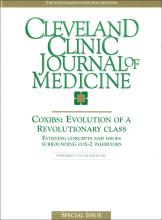ABSTRACT
Short-term endoscopic studies of the highly selective cyclooxygenase-2 (COX-2) inhibitors (coxibs) rofecoxib and celecoxib have shown that these agents are well tolerated and have efficacy equivalent to nonselective nonsteroidal anti-inflammatory drugs (NSAIDs) with fewer adverse effects on the upper gastrointestinal (GI) tract. These studies are limited, however, as the detection of endoscopic lesions is not well correlated with symptomatic ulcers and ulcer complications. Outcomes studies of the GI safety are, therefore, essential to understanding how coxibs are likely to perform in a clinical practice setting. Four large outcomes studies (Vioxx Gastrointestinal Outcomes Research, VIGOR; Assessment of Difference Between Vioxx and Naproxen to Ascertain Gastrointestinal Tolerability and Effectiveness trial, ADVANTAGE; Celecoxib Long-term Arthritis Safety Study, CLASS; and the Successive Celecoxib Efficacy and Safety Studies, SUCCESS) examined the GI safety of rofecoxib and celecoxib in over 39,000 patients with osteoarthritis or rheumatoid arthritis. Results of these studies showed that patients taking a supratherapeutic dose of rofecoxib or celecoxib had significantly lower rates of GI-related adverse events than those taking a non-selective NSAID (naproxen, ibuprofen, or diclofenac). Reduced risk of upper GI events was seen in patients with multiple risk factors and in patients using low-dose aspirin and corticosteroids concomitantly with a coxib. Results of large outcomes studies provide support for the COX-2 hypothesis and demonstrate the long-term safety and tolerability of coxibs.
- Copyright © 2002 The Cleveland Clinic Foundation. All Rights Reserved.






